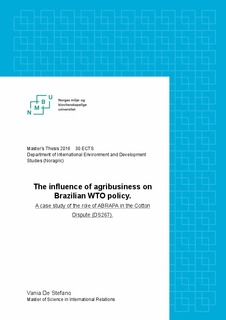| dc.description.abstract | Brazil has been the first developing country challenging and winning an economic dispute on agricultural issue against the United State of America (USA).
This thesis is a case study of the Cotton Dispute at the Dispute Settlement Body (DSB) of the World Trade Organisation (WTO). The Cotton Dispute was initiated by Brazil due to certain protectionist subsidies that the USA had on cotton.
The study took as a starting point the Brazilian domestic inequality and the presence of a strong agribusiness sector, and it focused on who lied behind the Brazilian victory at the WTO. The aim was to analyse the role of a strong Brazilian cotton association, ABRAPA, in order to understand whether they had influenced the Brazilian WTO policy. ABRAPA is the Brazilian Cotton Growers Association.
The analysis followed Putnam’s theoretical framework and was carried in two levels, the domestic and international levels. In addition, Putnam’s theory was integrated with Lukes’s first dimension of power.
At the national level ABRAPA played a role in influencing the Brazilian WTO policy by the use of economic, technical, and legal capacities. These represent the association’s potential power in influencing the WTO policy.
At the international level, ABRAPA’s role was given by its successful contribution in the dispute. The DSB found in fact that the US subsidies were not conformed to the WTO agreement.
However, the study found that ABRAPA’s influence to the Brazilian WTO policy can be understood only in cooperation with the Brazilian Government. ABRAPA and the Government were, in this study, the Brazilian domestic constituency and they had shared economic interests.
The interests at stake also contributed in understanding why what started as a dispute in the WTO, ended in a bilateral negotiation. The bilateral negotiation resulted favouring not only the USA, but also ABRAPA and the Government on the Brazilian side. ABRAPA played a role in widening the Brazilian domestic win-set and facilitated the ratification of the bilateral negotiation. | nb_NO |

